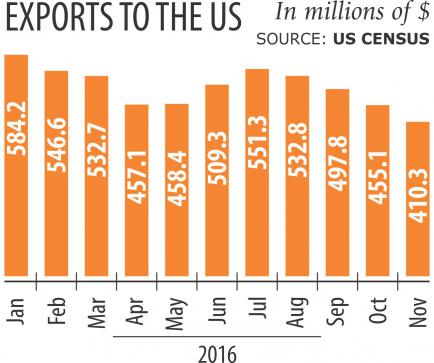 Shadows over prospects of garment exports to US
Shadows over prospects of garment exports to US
February 25, 2017
Exports from Bangladesh, particularly of garment items, will face further tariff competition in the US market if Donald Trump, the president-elect, implements his plan of border tax, one of his major campaign promises.
During his 17-month presidential campaign, Trump called for imposing border tax of between 35 percent and 45 percent on imports of goods to protect American jobs from unfair foreign competition.
Companies that import goods would pay the tax at the border.
“If the proposed border tax is imposed finally, we would be sufferers like other countries,” said Ahsan H Mansur, executive director of the Policy Research Institute, a private think-tank.
“The implementation of the proposed border tax would be the one of the worst news for us as well as for rest of the globe,” he added.
Although most of the attention is still focused on whether Trump will slap tariffs on China or target companies that move production offshore, proposals for a US tax regime that penalises imports could have a more permanent and far-reaching effect, reported the Financial Times.
“I think it would be a huge issue for Asia,” said Frederic Neumann, co-head of economic research at HSBC in Hong Kong.
“It would also raise the spectre of retaliatory measures by other countries,” Financial Times quoted him as saying.
Bangladesh's exports, particularly of garment items, would unequivocally be affected if Trump follows through on his campaign promise once he is sworn into office on January 20, according to Mansur.
Since the US does not have an adequate number of factories, the local manufacturers might not meet the demand.
As a result, the US retailers will depend on imported clothing items, particularly from Bangladesh and other Asian countries, which mainly produce the basic apparel items, Mansur said.
But the electronics and mobile phones companies from Asia will bear the maximum brunt of the proposed border tax as the US is also strong in production of those goods.
“Worst hurt would be exporters of low-margin products, where little value is added in the US and demand is sensitive to price. That could include many goods sold by US retailers such as Walmart, where higher prices would probably lead to lower consumption, hitting their makers,” the Financial Times reported.
Siddiqur Rahman, president of the Bangladesh Garment Manufacturers and Exporters Association, echoed Mansur's views on apparel shipments to the US, the single largest export destination for the country, as a result of the border tax.
“We will lose our competitiveness to the US if the proposed border tax is imposed,” Rahman added.
Currently, American retailers have to pay 15.61 percent duty for importing garment items from Bangladesh. Apparel items account for 95 percent of Bangladesh's total exports to the US in a year.
The US apparel importers have to pay 3.08 percent duty for importing products from China, 8.38 percent from Vietnam, 2.29 percent from India, 3.57 percent from Turkey and 6.30 percent from Indonesia.
Source:

